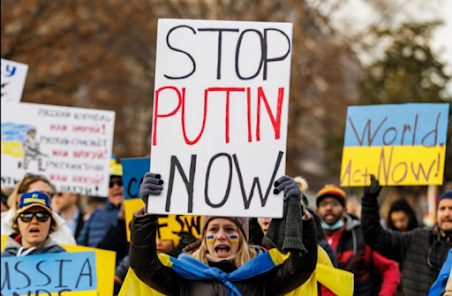 |
| Countries around the world have protested Putin’s invasion of Ukraine (Photo by Samuel Corum/Getty Images) |
International Military - Sanctions prohibiting imports of gas, oil and coal from Russia to European countries make other countries scramble to replace Russia in meeting the supply of oil, gas and coal. However, this will actually trigger damage to the world's climate, with sharp global warming.
UN Secretary-General Antonio Guterres says strategy. The "all-of-the-above" that major economies are now pursuing to end fossil fuel imports from Russia as its invasion of Ukraine could kill hopes of keeping global warming below dangerous levels.
Germany, Russia's biggest energy customer, wants to increase oil supplies from the gulf and accelerate the construction of terminals to receive liquefied natural gas. On March 22, 2022 US spokeswoman Jen Psaki said the reason for this Russia-Ukraine War was to get more supplies from our own country's soil.
Gutteres said instead of stepping on the brakes on a global economic decaborn, now is the time to put the pedal to the metal towards a renewable energy future. In the reports of scientists mankind is at serious risk fro climate change and will increase every tenth of the rate of warming.
Paris needs a 45 percent reduction in global emissions by 2030, therefore an agreement is made to limit global warming to 1.5 degrees Celsius (2.7 Fahrenheit) because there are still many countries that have not been able to reduce gas emissions.
In 2020 gas emissions had decreased due to the pandemic, but in 2021 emissions rose drastically to date and that would be a disaster.
Even Gutteres urged developed and developing countries to reduce emissions, and end their dependence on fossil fuel coal. Even hundreds of scientists in the UK and US publish an open letter to stop receiving funding from fossil fuel companies to suppress climate change which is increasing every month.
The IPCC report to be published on April 4 is not expected to include any direct reference to the effects of the war on Ukraine, said Jim Skea, who co-chaired the panel of experts who wrote it. "Our strength lies in gradually building up scientific information over a period of time and buying it bought up by governments and scientists," he said.
"And you can't do that at the same time as turning on a sixpence (turn quickly) to deal with current affairs." he added. However, it will outline how various energy policies will affect future emission trends. This includes plans to remove carbon dioxide from the atmosphere again. "That's a much bigger emphasis than before," Skea said.
